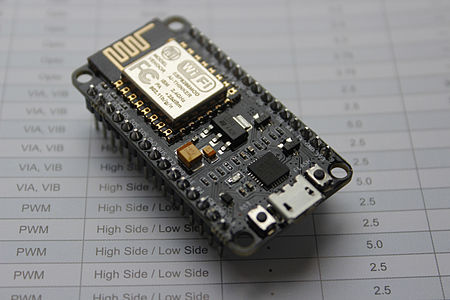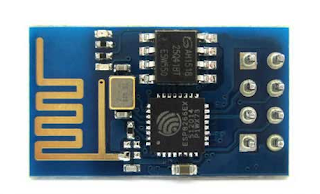Top 5 Development Boards for IoT in 2019
Development Boards are the heart of IoT application development. Without a good resource full development boards you cannot develop a powerfull IoT application. So, in this blog we are going to see top 5 development boards for IoT application development. Let's begin,
- Raspberry Pi :
Raspberry pi is a credit card size, open source development board for IoT. This is a UK based foundation, who developed this platform in 2011. Raspberry pi is microprocessor based platform. First version of this board developed in 2011 with a price tag of 25 Dollars. Initially, it was developed for school children not for the developer community. But eventually, it became so famous that now a days it's everywhere. It come with 10 different OS options, but the official OS is "Raspbian Stretch". Now a day, Raspberry Pi community offers 10 different type of development boards. Top model of this series is "Raspberry Pi 3 model B+".
 |
| Raspberry Pi B+ |
Technical Specifications :
- It has Broadcom BCM2837B0 64 bit, Cortex-A53(ARM8) processor.
- 1 GB of SRAM.
- 2.4 Ghz Bluetooth 4.2
- 5 Ghz IEEE802.11.b/g/n/ac wireless LAN support
- Gigabit Ethernet port for LAN
- 4 USB 2.0 ports
- CSI camera port
- DSI graphical LCD display port.
- HDMI support
- 20 x 2 pin headers
- 1 micro SD card slot.
- 5 V/2.5 Amp DC power input.
For more hardware details : Click Me
- Arduino (Genuino)
Arduino or Genuino is a open source hardware and software based development company. This company is based in Italy. They have also developed several development boards for Embedded System development and IoT application development. They have launched this platform in 2003 as opensource school project. But due to the support and lot's and lot's of love it became very fameous among developers as well as hobbyist. Arduino is as microcontroller based platform. First development board of this community is "Arduino Uno". Now a days it is also know as "Arduino Uno R3". It is also responsible for several other development boards like Arduino Pro, Arduino MEGA, Arduino Pro Mini, Lilypad, Due, etc...Most of the development board developed by this community comes with 8-bit microcontroller platform. Also most of the uses AVR microcontroller family as a core micro controller. Arduino Uno R3 is the most famous among all of these.
 |
| Arduino Uno R3 |
Technical Specifications :
- It uses microcontroller ATmega328P
- Operating voltage of microcontroller on 5V DC input
- Power supply requires between 7-12V
- Digital I/O pins - 14
- PWM - 6
- Analog input Pins - 6
- Flash Memory - 32 KB, 0.5 KB is for bootloader
- SRAM - 2 KB
- EEPROM - 1 KB
- Clock Speed 16 MHz
- On board led on Pin 13
- BeagleBone Black :
BeagleBone Black is the 3rd most eligible candidate for IoT application development. This board is developed by BeagleBoard organization for Linux enthusiasts and hobbyist. It embedded Linux environment, that mean you can port your own customized Linux OS on this board. Very fast and power full for Embedded and IoT application development. Large number of GPIOs with Digital as well as Analog input support. So let's checkout the technical specifications of the board,
 |
| BeagleBone Black |
Technical Specifications :
- Processor - AM335x, 1Ghz, ARM Cortex A8
- 512 MB DDR RAM
- 3D Graphics Accelerator
- 2 x 32 PRU microcontroller.
- USB client for power and communication
- USB Host
- HDMI Support
- 2 x 46 pin headers
- Compatible for Debian, Android and Ubuntu OS
- NodeMCU Development Kit :
NodeMCU is developed by ESP8266 comunity for IoT development. It is firmware based microcontroller board. It also supports Arduino, Embedded C, Micro Python programming. Power supply requiremnet of this board is very low. It work's on 3.3 V of power supply. It comes with on board WiFi support with wireless firmware transfer.
 |
| NodeMCU |
Technical Specifications :
- Single Board Type Microcontroller Board
- Operating System - XTOS
- CPU - ESP8266-12E
- Storage Memory - 4MB
- Power - 3.3 V via USB
- ESP8266-01
ESP8266-01 is also developed by ESP8266 comunity for IoT development. It's a very first version of ESP8266 series borads. It is also a firmware based microcontroller board. It also supports Arduino, Embedded C, Micro Python programming. Power supply requiremnet of this board is very low. It also work's on 3.3 V of power supply. It comes with on board WiFi support with wireless firmware transfer. You need to use UART TTL driver to upload the firmware. It have only 9 GPIO pins. Rest of the technical specifications are as follows,
 |
| ESP8266-01 |

Technical Specifications :
- Low cost Single Board Type Microcontroller Board
- InBuilt 32 Bit microcontroller with 80 Mhz
- CPU - ESP8266-01
- Storage Memory - 512 KB
- Power - 3.3 V via USB
- Programming Support Arduino, Lua, AT-Commands
Amazon Link :
 |
| ESP8266 |
YouTube :



![[Hindi]NLP 23# Named Entity Recognition P.2 |NLP|Python 3|Natural Language Processing|2019](https://blogger.googleusercontent.com/img/b/R29vZ2xl/AVvXsEg_rKP6EgXXQyJ4CingsJIl7LFH4UB7AYcnJ8HFp83-B9vkFY8hE19LQs86u5QKJaG3D9Cjs-uK_n6ND7AUYsiNfE6atNyLIzLoCwRoWNONUXqo0QzPDA3iQQ2lc27OsPdmhk6Kq8o3UYk/w100/NLP.png)
![[Hindi]NLP 24# Visualization of N.E.R |NLP|Python 3|Natural Language Processing|2019](https://blogger.googleusercontent.com/img/b/R29vZ2xl/AVvXsEiGVdEJLJT8XVpxJhY2ax4H8_hKQq_TIhz2bcuK5zhayYtOCKwMKwlcV11RMsOoLJoARQw6bovY3vAVksEbQGNHfA0o0pQydUeUA2D6IQ4kvr98LXwVyYcLhE4EA-aWEIlmMMj1ENtbzh0/w100/NLP.png)
0 Comments